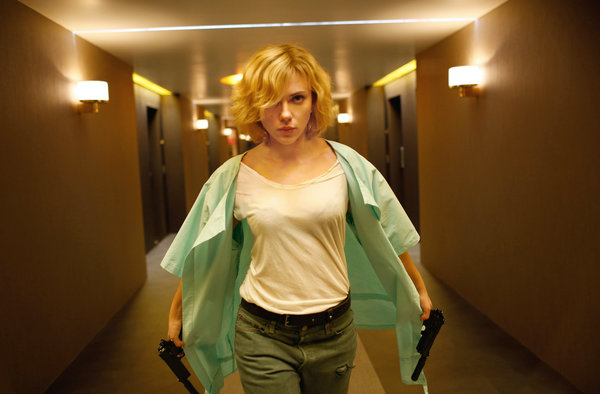(单词翻译:单击)
Thank goodness (or the goddess) for male directors who dig strong female characters. Whatever their reasons, these directors often expand the range of roles women play, whether it’s one of Howard Hawks’s dames calling the shots or one of James Cameron’s. That the French director Luc Besson, an industrious multi-hyphenate, has a thing for femmes fortes has been evident since 1990, when he unleashed a pouty toothpick in “La Femme Nikita,” a delirious, violent fantasy that turned an outlaw into a gun-toting gamine and an exploitable commodity that, in turn, spawned both an American big-screen remake (“Point of No Return”) and a television series.
感谢那些致力于挖掘强悍女性角色的男导演们(或者应该谢谢女神)。不管他们是出于什么动机,通常都拓展了女性角色的范畴,霍华德·霍克斯(Howard Hawks)和詹姆斯·卡梅隆(James Cameron)的影片里都有掌控一切的女性。勤奋而多才多艺的法国导演吕克·贝松(Luc Besson)对强势女人的迷恋则是从1990年的《尼基塔女郎》(La Femme Nikita)里那个干瘦如牙签、爱生气的女主角就可以看出来了,它是一个疯狂暴力的幻想,讲述一个不法之徒摇身一变,成为身背枪支的艳女和可供利用的商品,后来它在美国被翻拍为电影《尼基塔:永不回头》(Point of No Return),又被改编为电视剧。

Mr. Besson’s particular kink for fatal female beauties receives an entertaining workout in his latest film, “Lucy,” in which he again introduces a young woman who undergoes a remarkable metamorphosis that leads to convulsions of extreme violence and an increasingly frenzied visual style that lay waste to both men and any semblance of story sense. The nonsense begins when the title character — played by the improbable yet somehow perfect Scarlett Johansson — is pulled into a head-scratching plot in Taiwan, put into motion by a crime boss, Mr. Jang (the excellent South Korean actor Choi Min Sik). He’s set to begin peddling an experimental recreational drug that she accidentally ingests, and in such enormous quantities that she’s soon transformed from a slacking expat into super-Scarlett.
贝松对致命美女的奇想在他的新片《超体》(Lucy)中得到了有趣的体现,片中他再次推出一个经历重大变形的年轻女子,导致了极度暴力的动乱,也带来愈发疯狂的视觉风格,不仅破坏了片中的男人,也破坏了故事的外观。女主角露西由虽不太可信,但在某种程度上非常完美的斯嘉丽·约翰逊(Scarlett Johansson)饰演,她被卷入台湾一桩棘手的阴谋,由犯罪团伙头目江先生(Jang,韩国演员崔岷植精彩出演)策划,胡言乱语就从这里开始了。江计划走私一种试验中的娱乐毒品,露西不小心吞下了很多,结果很快从一个懒散的外国人变成了“超级斯嘉丽”。
Ms. Johansson’s rise as a major star is largely interesting because of its familiar reflexivity. Over a career that began in childhood — something that she shares with Elizabeth Taylor, along with sexual expressivity — she has taken on her share of unexceptional girls and women, but as her fame has increased, it’s become difficult for her to convey normality persuasively. Even when she has played more stock roles, she radiates extraordinariness, whether as a lust object in “Don Jon” or a dangerous agent in Marvel’s “Avengers” series. More unusual is her disembodied turn as a computer program in “Her” and her fleshed-out performance as a man-baiting, clothes-dropping E.T. in “Under the Skin,” both expressive of elusive, tantalizing, otherworldly stardom itself.
约翰逊成为巨星的经历非常有趣,因为这个过程有着人们所熟悉的自反性。她和伊丽莎白·泰勒(Elizabeth Taylor)一样,从童年时代就开始了带有性感魅力的演艺生涯,她演过平凡的女孩和女人,但是随着名声开始增长,她就愈来愈难以将“平凡”演绎得真实可信了,虽然她演过很多陈旧的角色,但也焕发出非凡的光彩,从《唐璜》(Don Jon)中的欲望对象到《复仇者联盟》(Avengers)系列中的危险特工都是如此。 更加不同寻常的是,她在《她》(Her)中出演没有实体的电脑程序,在《皮囊之下》(Under the Skin)中出演诱惑男人的美女,脱下皮囊就成了外星人,两个角色都表现出她难以琢磨而又充满诱惑,仿佛超越现实世界的明星气质。
Given this, “Lucy” can’t help registering as the latest brush stroke in Ms. Johansson’s emerging portrait. The movie opens with her character — cheerfully frowzy, with swinging earrings, teetering heels and the telltale cheap cat-print adornment — arguing with a shady type, who turns out to be a new fling. They’re just two little people dwarfed by the surrounding towers of power, one of which is soon splattered with blood and carpeted with shattered glass and bullet casings. Mr. Besson isn’t a director who likes the slow boil: One minute, Lucy is a good-time gal unencumbered by a pesky back story (history and psychology aren’t essential elements in his auteurist arsenal); the next, she’s embroiled in an intrigue that goes from Asia to far-outsville.
因此,《超体》为约翰逊正在崛起的形象添上了最后的笔触。影片以她饰演的人物开始,那是个欢快而又邋遢的女郎,耳环摇摇荡荡,穿着高跟鞋,印着猫咪的廉价装饰品颇为说明问题,她正和一个颇为可疑的人吵架,后来他成了她新的一段风流韵事。他们只不过是两个小人物,在周围象征权力的高楼映衬之下更加渺小,后来一个人很快弄出了流血、碎玻璃一地和枪战的场面。贝松不是那种喜欢慢慢酝酿的导演:一分钟前,露西还是个好姑娘,没有什么麻烦的背景故事(历史和心理状态不是贝松经常使用的工具);下一分钟,她就卷入了一个从亚洲直到非常遥远的地方的大阴谋。
Fueling this trip is the drug that, Lucy discovers after a blackout, has been surgically embedded in her tummy. Along with a handful of disposable types whose fates are sealed by their flop sweat and forgettable faces, she has been forcibly recruited as a drug mule. None of it makes much sense, but then Mr. Besson has never been one for narrative logic, being a bigger believer in the distractions of fast cuts, ping-ponging camera moves and spectacular bloodshed that sweep you up and away. He’s also good at casting, and Mr. Choi and Ms. Johansson are fun to watch as the action cranks up, and the drug leaks into Lucy’s system. It’s then that the movie goes from hyper to hyperkinetic: Suddenly she’s climbing the walls and scampering across the ceiling and into freedom, having tapped into newfound eerie powers. Yeah, the chase is on.
火上浇油的是,一次晕倒之后,露西发现那种毒品以外科手术方式被植入了她的胃里。她和其他几个可以被随便抛弃的角色(满头大汗和让人记不住的面孔决定了他们的命运)一起被毒贩子强行招募进来。这一切都没有什么意义,但贝松绝不是一个遵循叙事逻辑的人,他更喜欢用快速剪辑和来回切换的镜头运动来让你分心,还有让你震惊的流血大场面。他也擅长挑选演员。崔岷植和约翰逊都很精彩,情节越来越快,毒品渗入到了露西的身体系统里。之后影片就从兴奋走向了亢奋:突然,她爬过墙壁,惊惶地穿过天花板,利用这种新获得的古怪力量获得了自由。耶,追捕开始了。
In between bullets and brawls, Mr. Besson throws out a lot to explain Lucy’s transformation, including reams of on-screen text and one Professor Norman (Morgan Freeman). Mr. Freeman may have taken a break from playing God, but his character is another gloss on his familiar role as the resident kindly father figure who, until the story goes haywire, shepherds the younger co-star and the audience both. Specifically, Norman has charted the brain power of humankind that explains what’s happening to Lucy. (Seriously, he uses charts to explain his ideas to an audience that’s a stand-in for us.) Lucy seeks him out, having realized that her rapidly escalating physical supremacy is part of a one-woman human potential movement that’s leading her into total awesomeness. She aches just like a woman (well, at first), but breaks like a god.
在子弹与斗殴之间,贝松还抛出了很多关于露西变形的解释,包括大量字幕和一位诺曼教授(Professor Norman,摩根·弗里曼[Morgan Freeman]饰演)的解释。弗里曼可能是在扮演上帝的间隙来休个假,但他饰演的无非又是一个令人熟悉的角色:一直以来的善良父亲形象,等故事开始失控的时候,就像牧羊人一样指引年轻的明星和观众们。诺曼特别谈起人类大脑的力量,揭示了露西身上所发生的事(他使用图表,对着片中代表我们的一群观众严肃地解释自己的理念)。露西找到他,意识到自己不断增加的身体力量也是一个女人探索人类潜能运动的一部分,这彻底令她变得让人敬畏。她疼痛时像个女人(一开始是这样),但崩溃时像是神祇。
Buoyed by Ms. Johansson’s presence, Mr. Besson keeps his entertainment machine purring. He may be a hack, but he’s also a reliable entertainer, even when he’s recycling other directors’ ideas (a pinch of David Fincher here, a dash of Christopher Nolan there), or giddily engaging in slaughter and racist stereotypes. This is, after all, a movie that, stripped of its gimmick, comes down to a white woman being chased by hordes of Asian men. Mr. Besson’s thoughtlessness in this regard reaches an early nadir when Lucy shoots a Taiwanese man, nominally because he doesn’t speak English — a death that’s played for laughs. The scene’s vulgarity recalls Indiana Jones’s jokily shooting a sword-wielding Arab in “Raiders of the Lost Ark,” proving yet again that what looks new in Mr. Besson’s work is invariably old.
约翰逊的表演令人振奋,贝松让他的娱乐机器一直轰鸣作响。他或许有些粗制滥造,但他也是个可靠的娱乐提供者,甚至回收利用其他导演的创意(这儿有一点大卫·芬奇[David Fincher],那儿有一点克里斯托弗·诺兰[Christopher Nolan]),或者轻浮地拍摄屠杀和种族主义刻板印象时也是如此。去掉噱头,这毕竟只是一部关于一个白种女人被大群亚洲男人追赶的故事。在影片早期一个阴暗的时刻,露西开枪射杀一个台湾男人,主要是因为他不说英语,他的死主要是为了逗乐,这反映出贝松对这方面并未多加思考。这一幕的粗俗令人想起印第安纳·琼斯(Indiana Jones)在《夺宝奇兵》(Raiders of the Lost Ark)里开玩笑地射杀一个挥剑的阿拉伯人,再次证明贝松电影里看上去很新的东西其实不可避免很陈旧。


